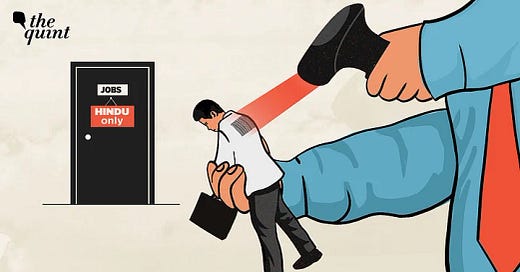The Question is… Why Are Some Job Portals Catering to One Faith?
Help us continue to do more such in-depth reports — become a member.
Dear Reader,
What do you usually ask an electrician before getting a broken light fixed?
The price of the new product? His labour fee? How fast he can get it done? That’s what I usually ask.
But a growing number of job and service platforms in India are adding a new filter: Religion.
A portal called ‘Call Hindu’, launched last month, describes itself as a "religious-socio-digital platform dedicated to the eternal light of Sanatan Dharma and the glorious tradition of Hindu culture."
Another platform, 'Hindu Links', started in 2022, encourages users to share contact details of Hindu carpenters, plumbers, electricians, drivers, workers, business owners, job seekers, painters, gardeners, street vendors, and even domestic workers. Around the same time, another website called 'Shoorvir Programme' emerged, which calls itself a "social service" for Hindu services and Hindu service providers.
The question is... How did faith-based job filtering become a trend?
These platforms are not emerging in a vacuum. Over the last few years, calls for the economic boycott of Muslims have grown louder—from fringe online groups to the main stage of political rallies. BJP leaders such as Nitesh Rane and T Raja Singh have also openly echoed such sentiments at public rallies.
A representative of one of these portals told me their aim was to offer a “safe option” for people “who don’t want rabid elements in their homes.”
Economist Khalid Khan, who co-authored a 2017 study on Muslims in Urban Informal Employment, explained that discrimination always existed in society, but "earlier, there was a perception that actively discrimination against any community is ethically incorrect."
But now, there is a political incentive, he said.
So, the question is.... despite being unethical, do they have legal standing?
Article 14 of the Indian Constitution guarantees that all persons are equal before the law, while Article 15 prohibits discrimination against any citizen based on religion, race, caste, sex, or place of birth.
But there’s a catch: These protections apply to state actions—so when private platforms make exclusionary rules, the legal clarity becomes murky. Constitutional lawyers told me that highlighted the need for India to have a uniform anti-discrimination code.
‘Hindu Samaj Should Be on Top’: Why Some Job Portals Are Filtering by Faith
Over the last few weeks, I’ve been inside Telegram and WhatsApp groups, speaking to founders, verifying websites, and understanding how this trend is spreading—and why it matters. But such stories require time and resources. Become a member* of The Quint today—and help us do more such deep-dive stories of public interest.
We rely on your support.
Thank you,
TANISHKA SODHI
Senior Assistant Editor
*Already a member of The Quint? What a star! Your support empowers us in our mission to question everything.
Want us to cover a story? Write to us at editor@thequint.com or reply to this email.





What a stupid and inflammatory topic. And completely irrelevant. The Quint Is focusing on such petty issues as though it is funded by the other side.